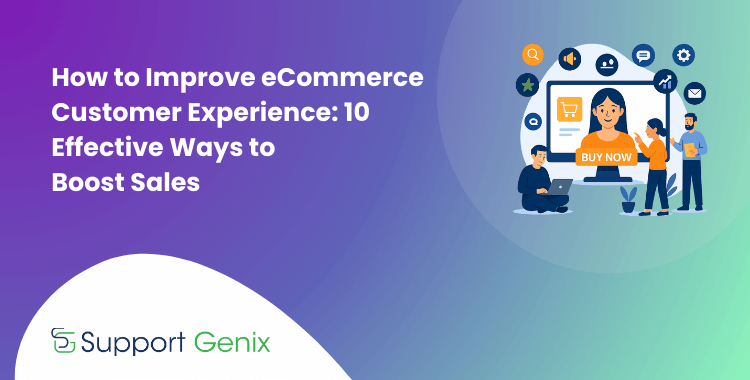How Can You Use Customer Data to Personalize the Customer Experience?
Personalization is crucial to stand out in today’s competitive market. Marketers use it to provide outstanding customer experiences. With advanced technology and abundant customer data, marketers can better understand their customers.
Marketers can use customer data to create personalized experiences. This article will explore how can you use customer data to personalize the customer experience. As a marketer, if you want to improve customer experience, keep reading. Learn how to use customer data for personalized strategies and enjoyable interactions.
Support Genix
WordPress Support Ticket Plugin
Take Your Customer Support to The Next Level and Boost Customer Satisfaction Rates
Types of Customer Data
There are four categories of customer data to explore. Each category provides insights into different facets of the customer experience.
Basic Data
Among the different types of customer data, basic data stands as the foundation. Collecting and analyzing basic information is involved in the process. This information includes customers’ names, email addresses, phone numbers, and other contact information. Basic data may appear unimportant, but it helps businesses create a customer database.
Behavioral Data
Businesses should pay attention to behavioral data, another type of customer data. Companies can gain insights into customer interactions through behavioral data. It can include information about signing up for a free trial. Users can also provide their login information for their accounts. Additionally, it can consist of details about deactivating their accounts.
Interaction Data
One valuable type of customer data is interaction data. Businesses use this data to gain insights into customer engagement. They analyze data from products, marketing campaigns, and brand presence. Businesses have the opportunity to acquire valuable insights into the buying behavior of their customers. They can also learn about their preferences and interests by analyzing interaction data.
Attitudinal data
Attitudinal data is a type of customer data. It offers direct feedback on your product or service. Conduct interviews, focus groups, and surveys to gain insight into customer perceptions. In addition, you can offer online reviews on your website. It will provide valuable attitudinal data. This data can help you identify areas for improvement. Using customer data can improve your business offerings and ultimately increase customer satisfaction.
Recommended Blog for You:
👉 Top 10 Reasons Why Customer Satisfaction Is Important For Businesses
👉 Provide Customers with an Unforgettable Experience
👉 Best WordPress Advanced Ticket Systems – Supercharge Your Customer Service
👉 How to Improve Current Customer Support Process
👉 6 Best WordPress Ticket Management Plugins
Ways to use customer data to personalize the customer experience
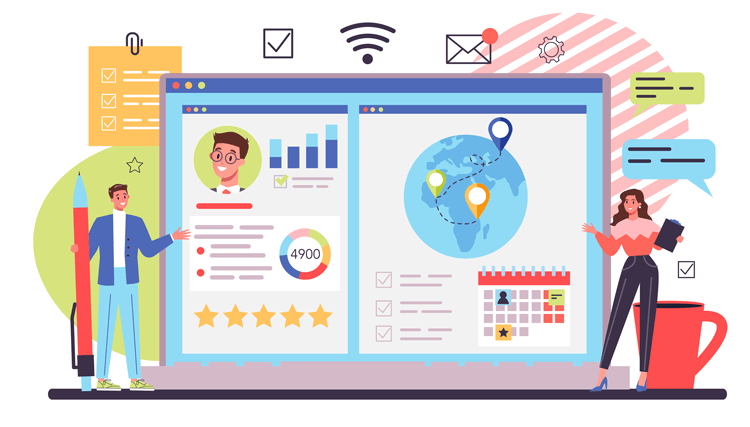
Utilizing customer data to personalize the customer experience is a powerful strategy that businesses can employ to drive engagement, loyalty, and growth
Understanding the Importance of Personalization in Customer Experience
Personalization in customer experience means customizing services to meet individual needs. Collect customer data, like preferences, behaviors, and purchase history. Offer a customized experience that makes customers feel appreciated and recognized. Establishing trust and loyalty can lead to increased customer retention and growth.
Using this data effectively is important. Analyze it to create customer profiles. Develop targeted marketing campaigns based on the analysis.
Importance of Personalization in Customer Experience
Here are some reasons why personalization is essential:
- Personalization helps build stronger customer relationships, leading to increased loyalty. Customers who feel understood and valued are more likely to stay loyal.
- Businesses can meet or exceed customer expectations by providing personalized experiences. It leads to higher satisfaction levels and improved customer satisfaction. Personalization demonstrates care for customers and willingness to go beyond.
- Personalized messages and offers capture customers’ attention. They cut through the clutter. Customers who receive personalized communication are more likely to engage and respond positively.
- Personalization can significantly impact conversion rates. Businesses can increase sales by offering content and promotions tailored to customers’ preferences. It raises the chances of turning potential customers into actual buyers.
Benefits of Personalization in Customer Experience
Personalization is a powerful tool in enhancing the customer experience. Here are some key benefits of personalization:
- Increased Customer Engagement: Personalized experiences make customers feel valued and understood. Companies can establish a stronger bond with customers by customizing their interactions. It increases engagement and loyalty by meeting specific needs, preferences, and past behaviors.
- Improved Customer Retention: Personalization plays a crucial role in customer retention. Businesses can foster long-term customer relationships by consistently delivering relevant and personalized experiences. Customers who are content are likely to remain loyal, leading to a decrease in churn and an increase in the lifetime value of the customer.
- Increased Sales and Revenue: Personalization can directly impact sales and revenue. Businesses can improve cross-selling and upselling by personalizing recommendations, offers, and communications. Personalized promotions increase the chances of conversions and repeat purchases. Targeted messaging also helps in this regard.
- Enhanced Brand Reputation: Businesses that offer personalized experiences are seen as customer-centric. They are also viewed as attentive to individual needs, enhancing brand perception. Customers perceive the business as caring and committed to their satisfaction. It improves brand perception.
Collecting Customer Data for Personalization
Collecting customer data for personalization is a strategic approach businesses use to enhance the customer experience, foster loyalty, and increase sales. This process involves gathering information about customers’ behaviors, preferences, and needs to provide them with personalized experiences.
Methods of Collecting Customer Data
There are several methods businesses can use to collect customer data. Here are some common methods:
- Online Forms: Businesses can gather customer data by using online forms. These forms are accessible on their websites or mobile apps. The forms can have fields for customers to provide different information. This information can include their contact details, preferences, feedback, and other relevant data.
- Surveys and Questionnaires: Surveys and questionnaires effectively gather customer data. Businesses can create surveys to directly collect customer feedback, opinions, and preferences. Surveys can be conducted through email, online platforms, or even in person.
- Customer Interviews: Conducting customer interviews can provide valuable insights and detailed data. These interviews can take place face-to-face, via telephone, or using video calls. Businesses can ask specific questions to understand customer needs, pain points, and preferences.
- Social Media Listening: Businesses can gather customer data by monitoring social media platforms. They achieve this by listening to conversations and analyzing trends. Businesses can track mentions, comments, and hashtags related to their brand. It enables them to understand customer viewpoints, preferences, and actions.
- Website Analytics: Businesses can collect data on customer behavior and interaction using website analytics tools. These tools offer data on website traffic, page views, and user demographics. They also provide conversion rate information. Businesses can analyze this data. It helps to understand customer preferences better. It also optimizes their online experiences.
- Purchase History and CRM Systems: Businesses can gather customer data using purchase history and CRM systems. These systems track customer interactions, purchases, preferences, and demographic information. By analyzing this data, businesses can personalize offerings and improve customer experiences.
Importance of Ethical Data Collection
- Ethical data collection practices build trust with customers. Customers are more likely to engage with a business. They know that they handle their data responsibly and securely. They willingly share their information in this case.
- Respecting customer privacy is essential to maintaining a positive relationship. Customers expect their personal information to be treated with care and confidentiality. Ethical data collection practices prioritize protecting customer data and respecting their privacy choices.
- Ethical data collection helps businesses understand customers’ needs, preferences, and behaviors accurately. This customer-centric approach improves business understanding. Companies can use this knowledge to offer personalized experiences. They can also customize their products or services based on it.
- Ethical data collection increases trust, customer loyalty, and positive brand perception. Ethical data collection practices support sustainable growth. Customers feel valued and confident in handling their data. They are more likely to continue engaging with the business. This leads to long-term success.
Analyzing Customer Data for Personalization
Analyzing customer data for personalization is a crucial step in creating tailored experiences. This process involves not just collecting vast amounts of data, but skillfully interpreting it to create more personalized, relevant, and engaging experiences.
Importance of Data Analysis
Customer data is essential for companies in today’s competitive business landscape. It enables them to stay at the forefront of trends. Companies can examine customer data to acquire an understanding of behaviors and preferences. It helps personalize interactions and offer tailored solutions for evolving needs.
Data analysis can benefit both small startups and multinational corporations. It helps you stay ahead of the competition and build long-term customer loyalty. Businesses can use customer data in many ways to drive engagement and sales. It includes tracking buying patterns and understanding customer sentiment.
Tools for Analyzing Customer Data
Amplitude
Amplitude is vital for leveraging customer data to boost retention and revenue. It analyzes customer behavior and product data. It creates insightful graphs. The graphs tell a compelling story. Connect behavioral patterns to conversions or drop-offs and collaborate seamlessly with team members. Amplitude goes beyond offering recommendations and measuring outcomes. With actionable insights, enhance your business strategy and drive growth.
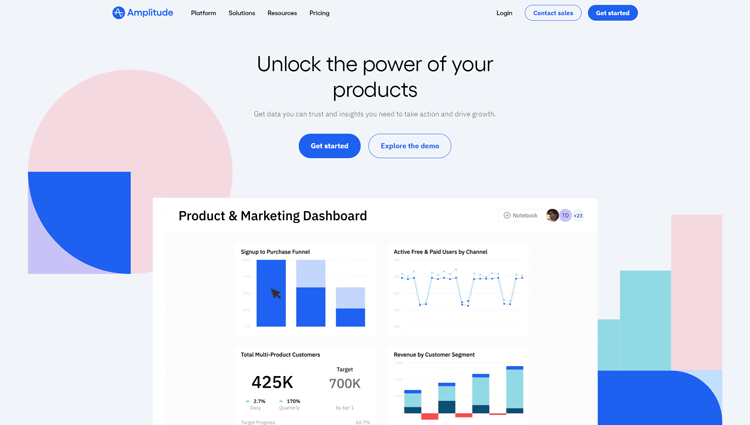
Key Features
- Increase monetization and funnel performance
- Analyze cross-device customer journeys
- Correlate actions to any outcome
Google Analytics
Google Analytics is a popular tool used by over 28 million active users worldwide. It helps track and monitor customer behavior on different devices and platforms. Customize reports to focus on relevant metrics for your business goals. It tracks website and mobile app data with easy event logging using SDKs.

Key Features:
- Audience Insights
- Customizable reports
- Mobile application tracking
- Seamless event logging
Mixpanel
Mixpanel, an excellent user data tool, provides key features for in-depth insights. Custom report generation is one of the included features. User interaction tracking is also included. An analysis of conversion, usage, and retention rates is also available. Mixpanel stands out for its ability to segment user actions. It can create funnels, enabling a comprehensive understanding of application-user interaction.
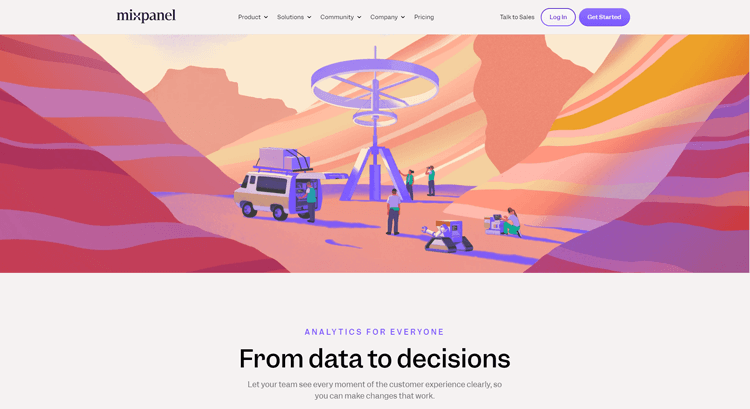
Key Features:
- Improved user experience
- Increased ROI
- Enhanced understanding of user behavior
- Tailored experiences for users, contributing to business success.
Zendesk
Zendesk is a customer support platform that offers tools for analyzing customer data. Zendesk Explore is a tool for reporting and analytics. It helps you understand your customer data easily. You have the opportunity to understand the behavior and requirements of your customers. You have built-in reports and can create your own.
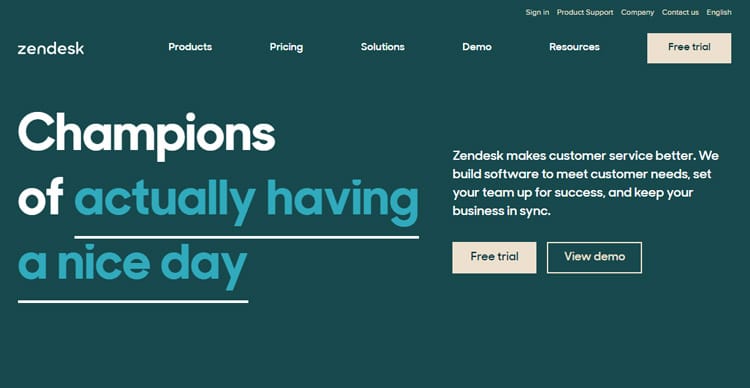
Key Features
- Zendesk Explore
- Collaborative Insights
- Multi-Channel Support
- Comprehensive Support Features
ChurnZero
ChurnZero helps customer success teams by combining data from different departments. This includes support, finance, product, and sales touchpoints. The software compiles customer health scores in real-time. Teams can identify friction points and prioritize tasks.
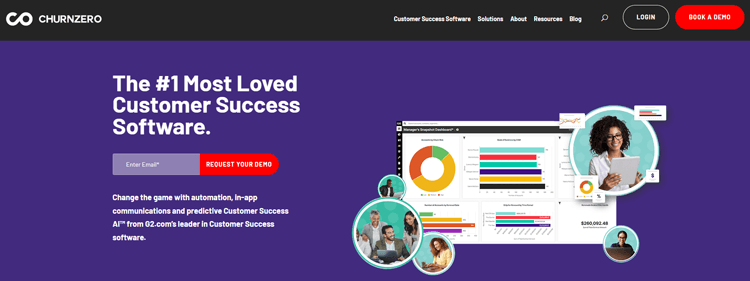
Key features:
- Comprehensive Customer Profiles
- Personalized Customer Experience
- Adoption and Retention
Identifying Customer Needs and Preferences
Identifying customer needs and preferences is essential for any business. In today’s data-driven world, it is necessary for success. But it’s not just about collecting customer data – it’s about knowing how to use it effectively. Companies can gain valuable insights by analyzing customer data. These insights include customer behavior, preferences, and buying patterns.
Companies can use this information to customize their products and services. They can do this to meet the needs of customers. Additionally, it helps increase customer satisfaction and drive business growth. Identifying customer needs and preferences is vital to any successful business strategy. You can achieve this through customer surveys, email marketing campaigns, or website analytics.
Support Genix
WordPress Support Ticket Plugin
Take Your Customer Support to The Next Level and Boost Customer Satisfaction Rates
Personalizing Customer Experience with Customer Data
Personalizing the customer experience has become a crucial aspect of modern business strategies. Businesses can gain valuable insights by leveraging customer data. They can also create customized experiences that resonate with their target audience.
Creating Customer Personas
Customer data can be used to create detailed customer personas. They are hypothetical profiles that represent different segments of your customer base. These personas can include information such as demographic details, buying habits, preferences, and pain points. By understanding these personas, businesses can develop products, services, and marketing strategies that resonate with each unique group of customers.
Customizing Products and Services
Once you have a clear knowledge of your customer personas, you can use this information to customize your products or services to meet their specific needs. This could mean offering personalized product recommendations based on previous purchases, or tailoring your services to address the unique challenges or goals of each customer. By customizing your offerings in this way, you can increase customer satisfaction and loyalty.
Personalizing Marketing and Communication
Customer data can also be used to personalize your marketing and communication efforts. This might send targeted email campaigns, which are based on a customer’s previous purchases or browsing history. The personalized messages can also be used on your website or social media channels. Personalized marketing can significantly improve engagement rates, conversion rates, and overall customer satisfaction.
Implementing Personalization Strategies
Importance of Testing and Measuring
- Testing and measuring allow you to check the performance of your marketing strategies. It includes evaluating your personalization efforts. Tracking key metrics allows you to assess campaign effectiveness. It helps identify areas for improvement.
- Through testing, you can identify which personalization strategies work best. You can find out what content variations your audience prefers. You can also discover which messaging resonates with them. This knowledge enables you to refine and optimize your strategy for better results.
- Testing and measuring provide valuable data for decision-making processes. This data-driven approach informs your decision-making. You have the option to assess the outcomes and determine which methods of personalization to persist with. You can modify or discontinue them as well.
- Continually test and analyze results. Identify areas to enhance personalization. This leads to better customer experiences, increased engagement, and improved business outcomes.
Challenges of Personalization
Personalization is powerful. It helps connect with customers individually for a meaningful experience. However, businesses face a few challenges when implementing personalization strategies.
Acquiring and using customer data is a major obstacle. It informs a personalized approach. It can be challenging to personalize content without accurate customer data. Personalized content resonates with customers on a personal level.
Businesses can utilize customer data to develop customized strategies. This can be achieved using appropriate tools and techniques. These strategies can be meaningful for customers.
Companies can create personalized experiences by understanding customer preferences. Incorporating data-driven insights can enhance customer loyalty and drive business growth.
Best Practices for Implementing Personalization Strategies
Businesses must first understand how to use customer data. This understanding allows for the successful implementation of personalization strategies. Companies can gain insight into customers’ needs and interests by analyzing their behavior.
They can also study their preferences, patterns, and history. Businesses can use this data to craft customized experiences for customers. These experiences aim to make customers feel attended to.
A personalized approach can greatly improve customer satisfaction and retention rates. It also helps drive sales. It is crucial to gather and use data responsibly and ethically. We must respect customer privacy and preferences.
Businesses can effectively use customer data by implementing best practices. This helps create personalized strategies that truly resonate with customers.
Ensuring Data Privacy and Security
Importance of Data Privacy and Security
- Customer trust and loyalty: Data privacy and security are essential for building and maintaining customer trust. Customers trust businesses that protect and handle data. This trust leads to brand loyalty.
- Legal and regulatory compliance: Compliance with data privacy laws and regulations is a legal need and critical for avoiding penalties and reputational damage. Ensuring privacy and security standards keeps your business lawful.
- Protection against data breaches: Data breaches can have severe consequences, including reputational damage, financial losses, and legal liabilities. Giving priority to data privacy and security reduces the risk of unauthorized access. It also lowers the risk of hacking and data breaches.
- Enhanced brand reputation: Demonstrating a commitment to data privacy and security enhances your brand’s reputation as a trustworthy and responsible organization. This can attract new customers. It can differentiate you from competitors. Competitors may have had security incidents in the past.
- Customer confidence in sharing data: In an era where data breaches are common, customers are more cautious about sharing their personal information. Prioritizing data privacy and security instills confidence in customers. It encourages them to provide the data needed for personalization and customization.
- Ethical responsibility: Respecting customer privacy and protecting their data is a moral responsibility. Customers have high expectations for how businesses handle their data. They want businesses to protect it from unauthorized access or misuse.
- Competitive advantage: Data privacy and security can be competitive in today’s marketplace. Customers are aware of their privacy rights. Businesses that focus on data protection can gain a competitive advantage. They achieve this by providing a safe and secure environment for customer interactions.
Compliance with Data Privacy Regulations
Understanding how to use customer data is crucial for targeted marketing and sales. Remember, collecting and using data comes with great responsibility for privacy and security. Compliance with data privacy regulations is a legal requirement and builds trust.
Ethical data practices create a loyal customer base. Customers appreciate personalized experiences and feel secure. Taking the required actions to follow regulations boosts customer happiness. It also builds a good business reputation.
Best Practices for Data Privacy and Security
In today’s digital era, safeguarding customer data is crucial. Companies should have strict policies to protect customer data from cyber threats. Access to sensitive information should be restricted to individuals who have been authorized. Encryption and multi-factor authentication add extra layers of protection.
Regularly monitoring system security and conducting thorough employee background checks are essential steps. Prioritizing data privacy and security protects customers. It also maintains trust and credibility with the public.
Bonus: Recommended Customer Support Tools
Support Genix
Support Genix is a comprehensive WordPress Support Ticket Plugin designed to help businesses manage customer support more efficiently. The plugin offers many features, allowing unlimited tickets, agents, and customers. This tool is an ideal solution for businesses of any size, including eCommerce shops, digital agencies, and service providers. Users can create tickets directly from your WordPress site, enabling them to get help quickly and conveniently.
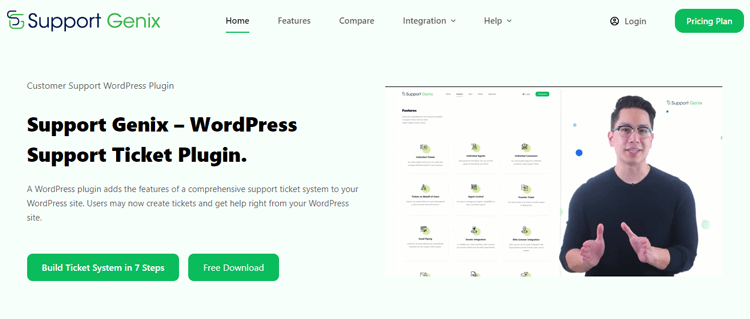
The plugin also allows for better team control and collaboration. It allows managing email notifications, creating custom fields, transferring tickets between agents or departments, and integrating with platforms like WooCommerce and Envato. The plugin is also equipped with a feature that allows agents to create tickets on behalf of users.
Furthermore, Support Genix includes an email handling system that can manage unlimited business emails, making tracking and responding to tickets easier. With its user-friendly tools and customizable settings, Support Genix simplifies the support process, improving the customer service experience.
Frequently Asked Questions
How does collecting customer feedback contribute to personalization?
Customer feedback offers insights into satisfaction, preferences, and pain points. Surveys, reviews, and direct communication all gather this valuable feedback. This data helps improve products or services and tailor future interactions accordingly.
Can social media activity be leveraged for personalization?
Businesses use social media platforms to monitor customer conversations, preferences, and sentiments. It helps them understand their customers better. Active tracking and analyzing of posts on Facebook, Twitter, and Instagram is possible. This data can inform personalized messaging, social media engagement, and targeted advertising campaigns.
Are there any ethical considerations when using customer data for personalization?
Yes, it’s important to handle customer data ethically and transparently. This includes obtaining consent. It also safeguards customer privacy. Additionally, it implements data security measures. These measures protect against unauthorized access or misuse.
How frequently should customer data be updated for accurate personalization?
It’s ideal to update customer data regularly to ensure accuracy and relevance. The frequency may vary based on your business and customer data changes.
Conclusion
To sum it up, using customer data to personalize experiences is key. It helps understand customer behavior and preferences. This understanding leads to tailored communications and services. This personal touch boosts customer satisfaction and loyalty. But remember, maintaining privacy is crucial while handling customer data. All in all, data-driven personalization is a must for businesses today. It’s not just a strategy, but a fundamental customer expectation.

